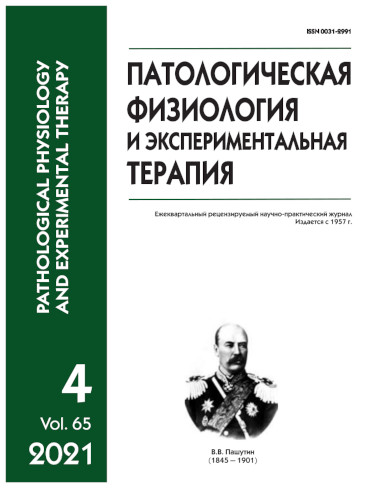Neonatal action of the dipeptidyl peptidase iv inhibitor diprotin A leads to a hyperactive phenotype formation and a prolonged increase in aggressiveness in rats
Abstract
Background. Inhibitors of the proline-specific serine protease dipeptidyl peptidase IV (DPP-IV, CD26, EC 3.4.14.5) may modulate a wide range of physiological processes and are used in the clinic. In our studies, we obtained evidence for the impact of DPP-IV inhibitors on adult rats' emotional and motivational behavior when administered in the early postnatal period. Diprotin A exhibited the most significant impact on the animals' behaviors. However, it is not clear how long the changes persist. Aim. To study the delayed effects of the DPP-IV inhibitor diprotin A on the severity of emotional and motivational disorders induced by the inhibitor action in the early postnatal period, in the dynamics of rats maturation from 2 to 7 months. Methods. Diprotin A was administered to rat pups daily on postnatal days 5–18, intraperitoneally, at a dose of 2 mg/kg, in a volume of 0.1 ml per 10 g of body weight. The rat pups of the control group received saline. The behavior of adult rats was assessed at the age of 2 and 7 months in the automated "open field," "Elevated Plus Maze" (EPM), forced swimming, and social interaction tests. Serum corticosterone levels were determined by ELISA. The results were statistically processed using Two Way ANOVA and nonparametric Mann-Whitney U-test adjusted for multiple comparisons. Results. Experimental rats increased motor activity and travel speed in the EPM test compared with the control group at 2 and 7 months of age. At the age of 7 months, experimental rats also increased vertical (rearing) activity. There were no signs of increased anxiety. Experimental rats demonstrated depression-like behavior judged by the biorhythmologic structure of swimming, more pronounced at 7 months. Non-aggressive social interaction in rats treated neonatally with diprotin A was reduced compared with controls at the age of 2 months and, on the contrary, increased at the age of 7 months. In these animals, the number and duration of aggressive social contacts were increased compared with controls at the ages of 2 and 7 months. Serum corticosterone levels in experimental rats at the age of 7.5 months were higher than in control. Conclusion. The present study results testify to the development of a hyperactive phenotype and prolonged psychoemotional disorders as increased aggressiveness along with hypothalamic-pituitary-adrenal axis activation in adult rats exposed to the action of diprotin A on postnatal days 5–18. The data support the dipeptidyl peptidase IV involvement in the genesis of psychoemotional disorders.






